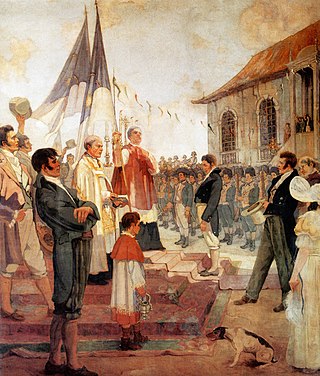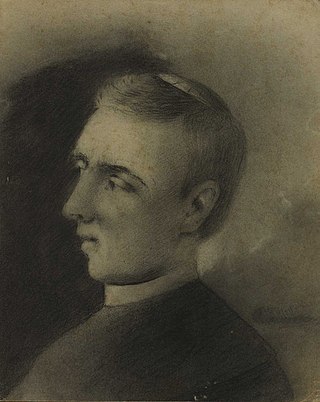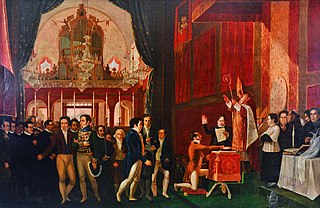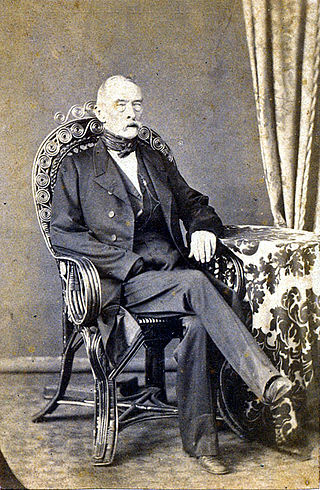
Dona Maria II "the Educator" or "the Good Mother", was Queen of Portugal from 1826 to 1828, and again from 1834 to 1853. Her supporters considered her to be the rightful queen also during the period between her two reigns.
The Praieira revolt, also known as the Beach rebellion, was a movement in the Pernambuco province of the Empire of Brazil that lasted from 1848 to 1849. The revolt, influenced by revolutions taking place in Europe, was due in part to unresolved conflicts left over from the Regency period and local resistance to the consolidation of the Empire of Brazil that had been proclaimed in 1822. The movement was led by radical elements of the Liberal Party of Pernambuco against the ruling Conservatives.

Hermes Rodrigues da Fonseca was a Brazilian field marshal and politician who served as the eighth president of Brazil between 1910 and 1914. He was a nephew of marshal Deodoro da Fonseca, the first president of Brazil, and general João Severiano da Fonseca, patron of the Army Health Service. His parents were the marshal Hermes Ernesto da Fonseca and Rita Rodrigues Barbosa.

The Confederation of the Equator was a short-lived rebellion that occurred in the northeastern region of the Empire of Brazil in 1824, in the early years of the country's independence from Portugal. The secessionist movement was led by liberals who opposed the authoritarian and centralist policies of the nation's first leader, Emperor Pedro I. The fight occurred in the provinces of Pernambuco, Ceará and Paraíba.

The Liberal Revolution of 1820 was a Portuguese political revolution that erupted in 1820. It began with a military insurrection in the city of Porto, in northern Portugal, that quickly and peacefully spread to the rest of the country. The Revolution resulted in the return in 1821 of the Portuguese court to Portugal from Brazil, where it had fled during the Peninsular War, and initiated a constitutional period in which the 1822 Constitution was ratified and implemented. The movement's liberal ideas had an important influence on Portuguese society and political organization in the nineteenth century.

The Pernambucan revolt of 1817, also known as The Priest's Revolution, occurred in the province of Pernambuco in the Northeastern region of Brazil, and was sparked mainly by the decline of sugar production rates and the influence of the Freemasonry in the region. Other important reasons for the revolt include: the ongoing struggle for the independence of Spanish colonies all over in South America; the independence of the United States; the generally liberal ideas that came through all of Brazil the century before, including many French Philosophers, such as Charles Montesquieu and Jean-Jacques Rousseau; the actions of secret societies, which insisted on the liberation of the colony; the development of a distinct culture in Pernambuco.

The Conspiracy of Suaçunas, also known by its archaic spelling, the Conspiracy of Suassuna, was a plot to overthrow Portuguese rule in Brazil at the turn of the 19th century. The conspiracy was centered in Olinda, Brazil.

The April Revolt, or Abrilada in Brazil's history was an episode in 1832 in the then province of Pernambuco, which fits into the Regency Period, in the context of Cabanagem. After the abdication of D. Pedro I of Brazil and his return to Europe where he played a decisive role in the Portuguese Civil War (1828–1834), the movement in Pernambuco, a conservative and absolutist, aimed at the renewal of D. Pedro I to the throne.

The Brazilian War of Independence was an armed conflict that led to the separation of Brazil from the United Kingdom of Portugal, Brazil and the Algarves. The war was fought across various regions of Brazil, including Bahia, Maranhão, Pará, Piauí, and Cisplatina, with naval battles occurring along the Atlantic coast. Brazilian forces, consisting of regular troops, local militias, and a hastily assembled fleet, defeated the Portuguese garrisons to establish the Empire of Brazil under emperor Pedro I. The war formally ended with the Treaty of Rio de Janeiro in 1825, in which Portugal recognized Brazil's independence.

The State of Brazil was one of the states of the Portuguese Empire, in the Americas during the period of Colonial Brazil.

Frei Joaquim do Amor Divino Rabelo, born Joaquim da Silva Rabelo, commonly known as Frei Caneca, was a Brazilian religious leader, politician, and journalist. He was involved in multiple revolts in Northeastern Brazil during the early 19th century. He acted as the main leader on the Pernambuco Revolt. As a journalist, he founded and edited Typhis Pernambucano, a weekly journal used on the Confederation of the Equator.

Events in the year 1904 in Brazil.

Events from the year 1894 in Brazil.

The regency period is how the decade from 1831 to 1840 became known in the history of the Empire of Brazil, between the abdication of Emperor Pedro I, on 7 April 1831, and the declaration of majority of Pedro II, who was legally declared of age by the Senate at the age of 14 on 23 July 1840.

João Frederico Caldwell was a Portuguese-born Brazilian marshal and politician who was a military figure during the 19th century. He was known for his extensive career since the Pernambuco revolt and was one of the main leaders of the Paraguayan Invasion of Rio Grande do Sul during the Corrientes campaign of the Paraguayan War.

The history from the Brazilian state of Alagoas begins before the discovery of Brazil by the Portuguese, when the territory was inhabited by the Caeté people. The coast of the current state of Alagoas, recognized since the first Portuguese expeditions, was also visited early on by vessels of other nationalities for the barter of brazilwood.

The Province of Alagoas was part of the United Kingdom of Portugal, Brazil and the Algarves, and later of the Empire of Brazil, being created after the Captaincy of Alagoas.

The Captaincy of Alagoas was created on September 16, 1817, from the dismemberment of the Captaincy of Pernambuco. The capital was located in the current city of Marechal Deodoro under the name of Santa Maria Madalena da Lagoa do Sul.
The Belém Rebellion (1823) was a rebellion against the Kingdom of Portugal as an attempt to proclaim independence to Grão-Pará and integrate into the Brazilian Empire.
















